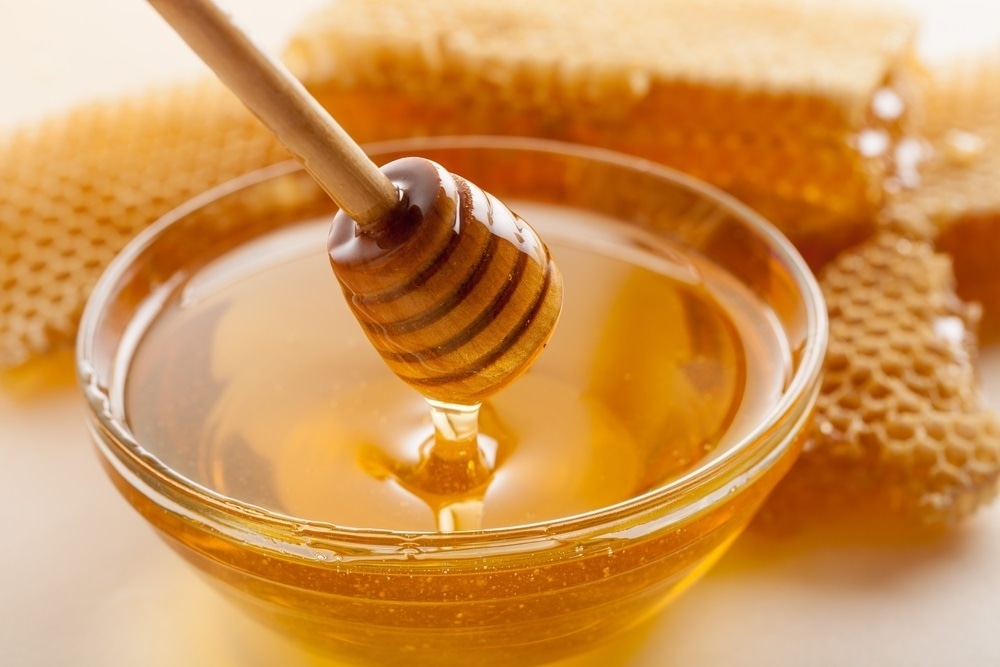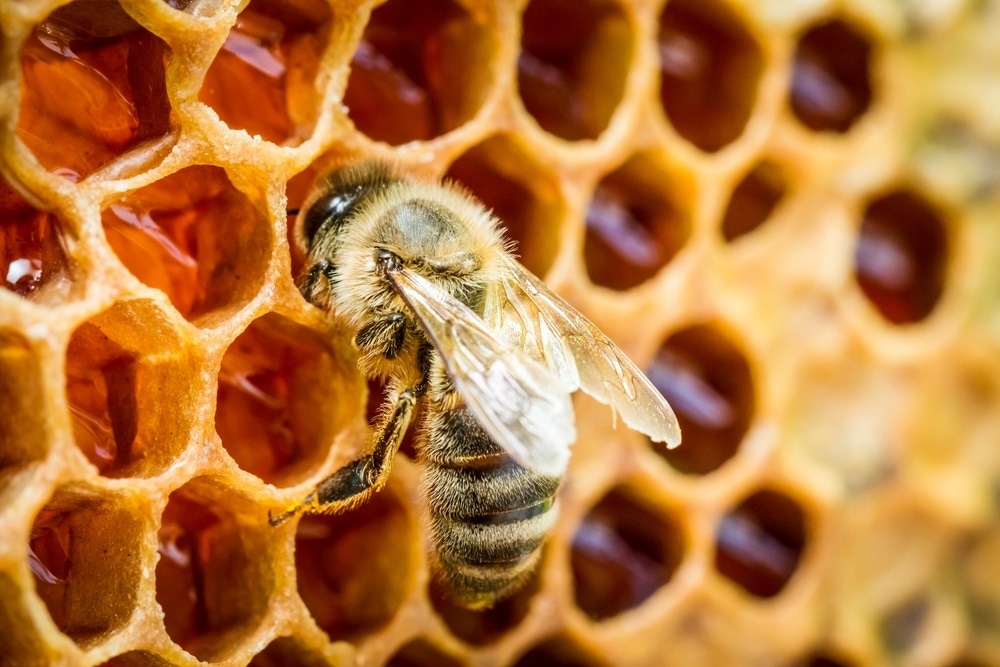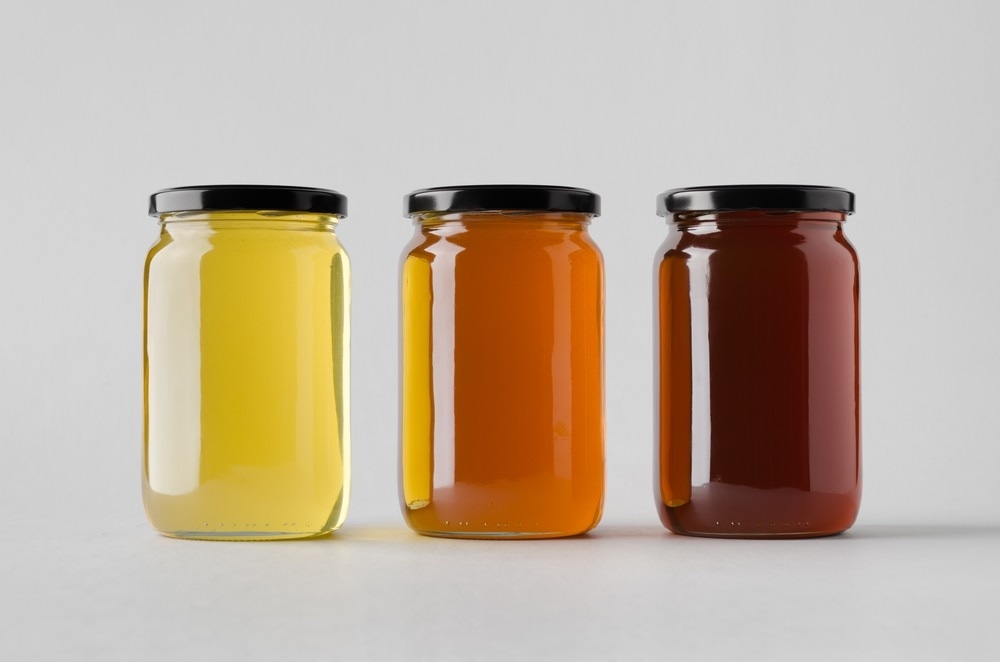With a growing focus on healthy eating, the demand for honey has been increasing. Producers of genuine honey cannot compete with the fraudsters since their honeys are continually being undercut by cheap imitations.
In this interview, News-Medical talks to Ron Phipps about food fraud within the honey industry and the methods for investigating it.
Can you give us an overview of food fraud and why it is such an issue for honey production?
Food fraud has devastating consequences, particularly in the field of honey production, which the U.S. Pharmacopeia has classified as the third largest area of adulteration in the current era. Our aim is to find solutions to solve this problem and prevent its recurrence.
During the past two decades, there has been a food fraud epidemic. This has involved economically-motivated adulteration, customs fraud, label fraud and other types of fraud; including a variety of products such as honey, meats, coffee, wines, juices, maple syrup, edible oils and frozen versus fresh fish.
The USP's food fraud list describes foods that have been the most common subjects of adulteration. In response to this food fraud epidemic, a growing international movement is working to oppose food fraud - this includes the United Nations Food and Agricultural Organization.
Food fraud in the sphere of international honey has provided the international community with a very vivid case study. Over a 20 year period there has been explosive growth in the quantities of product produced, but at the same time, the number of beehives throughout the world has been stable.
During the same period, numerous factors affecting bees and plants have caused productivity (measured by the weight of honey per hive) to decline. This decline in productivity is coupled with the collapse of honey pricing resulting from food fraud.

Image Credit: Billion Photos / Shutterstock.com
How has this impacted the honey market?
We have seen a contradiction between retail and wholesale honey prices - patterns that have been described as manifesting a complete aberration of the laws of economics. Demand has increased and prices have increased on the retail level, but on the beekeeper level, both prices and productivity have declined while the cost of production has substantially increased.
In this scenario, the prices of input should dramatically increase, not collapse. Food fraud has created an existential economic catastrophe for beekeepers producing authentic honey, who now find themselves in price competition with sellers of low-priced fraudulent products. Dr. Stan Daberkow (Emeritus Economist from the U.S. Department of Agriculture) has illustrated this contradiction, whereby the prices of honey on the retail level have increased and the prices for the beekeepers have collapsed.
Two scientific committees representing the World Congress of Beekeepers issued a report regarding the decreasing prices of honey. This report describes adulteration as the greatest threat to beekeepers in the history of beekeeping, showing that the economic damage to beekeepers who produce authentic honey is approximately $1 billion. When we look at a more macro position, however, the losses are in fact many billions of dollars just during the past 5 years.
What methods are being used in honey adulteration?
Authentic honey can be understood as honey resulting from the complete interaction of zoological and botanical lifeforms, bees transforming nectars and other secretions of plants into honey. Reports of adulteration in Europe, Canada, Australia, and India, as well as numerous reports in the Chinese press and the Indian press indicate that adulterated honey is being sold to consumers all over the world.
In the United States, honey anti-dumping orders resulted in a number of prosecutions by the U.S. Department of Commerce, charging honey importers with criminal activity, and highlighting the collusion of packers, importers and exporters. This was referred to as Honeygate and was described as the largest example of food and customs fraud in the history of the United States.
There are various modes of adulteration in the honey industry, including addition of extraneous sweeteners, use of resin technology, added pollen, and extraction of unripe honey, and these modes are used separately and/or in combination with one another. It is relevant to note that currently a composite containing adulterated products - irrespective of the percentage of the adulterants - is regarded as adulterated. This is per Codex standards.
These methods of illicit production have created a situation where the quantities of adulterated honey have no ceilings and their prices have no floors. This allows those engaged in adulteration to reap illicit profits while those who produce authentic honey have faced declining economic incentives, putting in jeopardy their economic survival as beekeepers.
Recently a report of French beekeepers who were interacting with a Chinese delegation in France was published on the website Apiservices. The beekeepers were mocked by the Chinese delegation who described the French modes of authentic honey production (which are similar to American, Canadian and Argentine modes of production) as archaic. Walter Haefeker (President of the European Beekeepers Association) described the Chinese method of honey production as comparable to a modern European brewery, certainly not the classic modes of honey production. He further contrasted the methods as "fast food vs. slow food.".

Image Credit: Shaiith / Shutterstock.com
What methods are being employed to investigate the authenticity of honey products?
The detection of any of the above modes of adulteration requires the use of most advanced scientific instrumentation, along with a comprehensive global honey database. This is especially true for a food product like honey, which is the product of many variables and manifests great chemical diversity.
Fortunately, the analytic toolbox for detecting food fraud in honey, as well as numerous other products, contains very sophisticated scientific methodologies. The quality and authenticity of food products cannot be abstracted from either their chemical constituents or the modes of production of those products.
Nuclear magnetic resonance (NMR) is one of the most prominent scientific tools used for the analysis of honey. This technology is continuously being updated, and there are currently approximately 20,000 samples which form the global database of honey, which is continuously expanding.
This contrasts with the database of traditional methods used to deal with the types of adulteration that were prevalent 20 years ago - then, the database had only 100 samples, and 98% of these were from American beekeepers.
NMR can be used to test over 36 parameters characterizing the chemical profiles found in authentic honey. It can detect numerous features including geographic and local origin, as well as botanical origin, and must be used in a comprehensive way.
The struggle against food fraud and for justice in the honey industry has led to a wide range of countermeasures including deferred prosecution for honey circumvention involving 30 countries. All of the honey that was being circumvented, in order to avoid anti-dumping duties, was believed to be adulterated honey, produced using models of production which are not consistent with the authenticity of honey.
Where can our readers find out more about the issue of honey adulteration?
There is a very important Netflix documentary 6 part series called Rotten, the first of which concerns honey adulteration. Also, the U.S. Department of Agriculture released a commercial description of honey in December, 2019, and the U.S. Pharmacopeia's has released a standard for honey in 2020 and has now completed its comment period.
Professor Michael Roberts, a legal expert in food fraud, has two important "White Papers" regarding food fraud in the honey industry. These should be mandatory reading because they describe the importance of honey on a global basis. Not only are beekeepers an endangered species, as Michael describes, but their endangerment constitutes a grave threat to global food security and ecological sustainability.

Image Credit: Shablon / Shutterstock.com
What are the global honey industry’s next steps in the fight against adulterated honey?
The Apimondia Forum on Honey Adulteration was held in September 2019 in Montreal, Canada. It had 5,000 members in attendance, a thousand of which attended the largest meeting on honey adulteration in the history of the honey industry.
That meeting was an inflection point, because those who had historically opposed NMR testing and those who had supported modes of adulteration like adding bio-engineered sweeteners, use of resin technology, or extraction of immature honey before it has been properly transformed from nectar into honey, became totally isolated. These members were forced to realize the impact that improper practices had on the honey industry, and these milestones can be understood as a tributary flowing into a large river, leading to an era of justice for beekeepers.
The struggle against food fraud, both in the sphere of honey and more generically, is evolving and is being manifested in many spheres. The foundation of these efforts resides in scientific advances in detecting modes of adulteration and food fraud. It also includes developing a rigorous, comprehensive, and more intrusive traceability regime that more fully incorporates the methods of production within the traceability.
A demarcation between legitimate and illegitimate modes of production is emerging and we are in an era of unprecedented awareness, opposition, and concern with food fraud in general.
About Ron Phipps
Ron Phipps is Vice President of the Apimondia Scientific Commission on Beekeeping Economy, and author of International Honey Market Reports which appear in the American Bee Journal and the apiservices.biz website. He is also chief author of Marketing of the American Honey Crop in the Hive and the Honeybee (Dadant, 2015). He has organized international symposiums on Honey and Health. He is a pioneer in the international honey trade and actively involved in efforts to promote authenticity of honey as the foundation for the creative marketing of honey.
His academic work includes service as the Personal Assistant to the President of the American Philosophical Association. With the support of the National Science Foundation, his work in theoretical physics has led to publications, including "An Infinite, Open and Integrated Universe," "The Modalities to Develop an Educational System of Discovery, Innovation and Creativity" and "Integral Philosophy: An Essay in Speculative Philosophy." Phipps has helped to guide the Long Island Concert Orchestra and Chamber Players International, as Chairman of the Board.
About Bruker BioSpin Group
The Bruker BioSpin Group designs, manufactures, and distributes advanced scientific instruments based on magnetic resonance and preclinical imaging technologies. These include our industry-leading NMR and EPR spectrometers, as well as imaging systems utilizing MRI, PET, SPECT, CT, Optical and MPI modalities. The Group also offers integrated software solutions and automation tools to support digital transformation across research and quality control environments.
Bruker BioSpin’s customers in academic, government, industrial, and pharmaceutical sectors rely on these technologies to gain detailed insights into molecular structure, dynamics, and interactions. Our solutions play a key role in structural biology, drug discovery, disease research, metabolomics, and advanced materials analysis. Recent investments in lab automation, optical imaging, and contract research services further strengthen our ability to support evolving customer needs and enable scientific innovation.